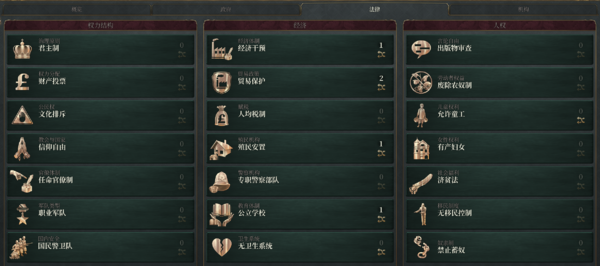小无编辑摘要 |
(→官僚体制: 1.0化) |
||
| 第101行: | 第101行: | ||
! width=10% | 改制限制 | ! width=10% | 改制限制 | ||
! width=20% | Interest Group Opinions | ! width=20% | Interest Group Opinions | ||
|- id="世袭官僚制" | |||
| {{Iconbox|世袭官僚制|官僚通过传统的继承方式持有职位,将职责传给自己的子女。|image=Law hereditary_bureaucrats.png}} | |||
| 无 | |||
| | |||
* {{icon|bureaucracy}} {{green|−25%}} 人口花费乘数 | |||
* {{icon|landowners}} '''+25%''' 地主政治力量 | |||
| [[File: Law appointed_bureaucrats.png|24px]] 任命官僚制 | |||
|{{Icon|intelligentsia}}Intelligentsia {{Red|disapprove}} | |||
{{Icon|bourgeoisie}}Petit Bourgeoisie | |||
{{Red|disapprove}} | |||
{{Icon|landowners}}Landowners | |||
{{Green|approves}} | |||
|- id="任命官僚制" | |- id="任命官僚制" | ||
| 第106行: | 第122行: | ||
| | | | ||
| | | | ||
* {{icon|money}} {{green|+25%}} Taxation Capacity | |||
*{{icon|intelligentsia}} '''+25%''' 知识分子政治力量 | *{{icon|intelligentsia}} '''+25%''' 知识分子政治力量 | ||
| [[File: Law elected_bureaucrats.png|24px]] 选举官僚制 | | [[File: Law elected_bureaucrats.png|24px]] 选举官僚制 | ||
[[File: Law hereditary_bureaucrats.png|24px]] 世袭官僚制 | [[File: Law hereditary_bureaucrats.png|24px]] 世袭官僚制 | ||
|{{Icon|intelligentsia}}Intelligentsia {{Green|approves}} | |||
{{Icon|bourgeoisie}}Petit Bourgeoisie | |||
Neutral | |||
{{Icon|landowners}}Landowners | |||
|- id="选举官僚制" | |- id="选举官僚制" | ||
| 第118行: | 第141行: | ||
| | | | ||
* {{icon|bureaucracy}} {{green|−15%}} 机构花费乘数 | * {{icon|bureaucracy}} {{green|−15%}} 机构花费乘数 | ||
* {{icon| | * {{icon|bourgeoisie}} '''+25%''' Petite bourgeoisie political strength | ||
| [[File: Law appointed_bureaucrats.png|24px]] 任命官僚制 | | [[File: Law appointed_bureaucrats.png|24px]] 任命官僚制 | ||
|{{Icon|intelligentsia}}Intelligentsia Neutral | |||
{{Icon|bourgeoisie}}Petit Bourgeoisie | |||
{{Green|approves}} | |||
{{Icon|landowners}}Landowners | |||
{{Red|disapprove}} | |||
|} | |} | ||
2022年11月15日 (二) 10:54的版本
- 参见:法律
权力结构法律决定方方面面国家事物中何者居于统治地位。
治理原则是最为基础性的体制,例如君主制或议会共和制等,此类决定了国家元首的人选,以及其肩上扛了谁的担子。
权力分配的光谱涵盖了从独裁制到寡头制,投票权一路延伸下去,直至普选。
公民权及教会与国家法律规定哪些人群因其文化或宗教在该国受到法律歧视。
官僚体制的原则——例如世袭官僚制或选举官僚制——决定了管理国内公民及其管理机构的成本,但也可直接让一些群体受益。
军队类型让玩家在战争时期培养一部分平民劳动力作为士兵,而国内安全则是管理内务反叛乱机构的运作方式。
军队类型
军队的组织和管理方式。
| 法律 | 需求 | 修正 | 改制限制 | Interest Group Opinions |
|---|---|---|---|---|
| 无 |
|
无 | ||
| 无 |
|
无 | Neutral | |
|
无 | Neutral | ||
|
无 | disapprove |
官僚体制
如何管理你的国家。
| 法律 | 需求 | 修正 | 改制限制 | Interest Group Opinions |
|---|---|---|---|---|
| 无 | disapprove approves | |||
Neutral | ||||
approves disapprove |
教会与国家
身体的统治者与精神的统治者之间的关系。
| 法律 | 需求 | 修正 | 改制限制 | Interest Group Opinions |
|---|---|---|---|---|
|
公民权
扩展公民权。
| 法律 | 需求 | 修正 | 改制限制 | Interest Group Opinions |
|---|---|---|---|---|
|
||||
权力分配
政治权力是如何被分配的。这决定国家元首对谁负责。
| 法律 | 需求 | 修正 | 改制限制 | Interest Group Opinions |
|---|---|---|---|---|
|
||||
治理原则
国家治理的基本原则与权威。决定了什么人是国家元首。
| 法律 | 需求 | 修正 | 改制限制 | Interest Group Opinions |
|---|---|---|---|---|
| 仅NPC可用 | ||||
| 无 | ||||
| 无 | ||||
| 无 | ||||
| 无 | ||||
| 无 |
国内安全
保持国内有序。
| 法律 | 需求 | 修正 | 改制限制 | Interest Group Opinions |
|---|---|---|---|---|
| 无 | 无 | 无 | ||
| 无 | ||||
| 无 | ||||
| 无 |

































